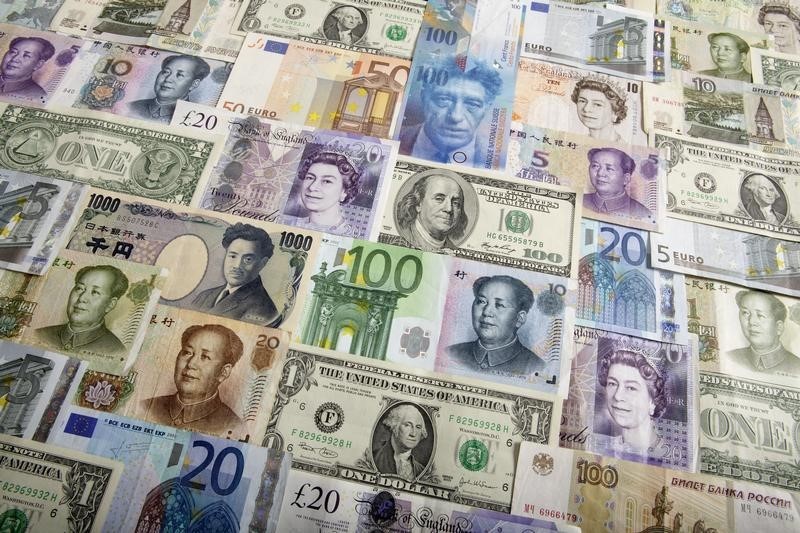Poll: More stable outlook for emerging FX on slower Fed rate hikes

Arrangement of various world currencies including Chinese Yuan, Japanese Yen, US Dollar, Euro, British Pound, Swiss Franc and Russian Ruble pictured in Warsaw January 26, 2011. REUTERS/Kacper Pempel
By Vuyani Ndaba and Silvio Cascione
BRASILIA (Reuters) - The three-year rout in foreign exchange emerging markets is probably easing off, a Reuters Poll suggested on Thursday, with an increasing number of strategists questioning whether the U.S. dollar will be able to set new highs.
Median forecasts for currencies such as the Turkish lira
The range of estimates also widened for most pairs covered in the survey, signaling that an increasing number of analysts are less persuaded about a continued appreciation in the U.S. dollar.
"I don't expect emerging market currencies to strengthen against the dollar, but I think that it is reasonable to assume that they will be far more stable than last year," said Piotr Matys, emerging market strategist at Rabobank.
Some are already forecasting the start of a turnaround. A few analysts are projecting the Brazilian real at 3.30 per dollar early next year and the Turkish lira at 2.70, rates not seen since July 2015.
The most upbeat views were at odds with long-standing forecasts for further currency weakness, with some analysts still estimating record highs for the dollar against the lira, at 3.47, the rand, at 19.17, and the real, at 4.69.
"One of the main reasons why the emerging market currencies are far more stable against the dollar is the fact that the market significantly repriced its expectation regarding the part of Fed tightening this year," Matys added.
Last month, a Reuters poll suggested two U.S. Federal Reserve interest rate hikes are likely this year despite growing concerns about weak global growth and inflation. [ECILT/US]
The Fed's December decision to raise rates for the first time in nearly a decade has been under scrutiny, with some market players suggesting it was a mistake and that Chair Janet Yellen may have to backtrack. [ECILT/US]
At minimum, they are currently widely expected to pause at the policy meeting later this month.
The dollar began to surge against emerging market currencies in northern summer 2013, when the Fed began to signal the gradual unwinding of its massive monetary stimulus deployed in the aftermath of the 2008-09 global financial crisis.
The Chinese economic slowdown and the subsequent plunge in commodities prices further hampered emerging-market currencies, with a recent bout of volatility in the first weeks of 2016.
There still remain questions over the health of the global economy. While the majority of analysts in the poll see little risk of a sharp devaluation in the Chinese yuan, Beijing's policy flip-flops and Britain's referendum on its European Union membership could trigger risk aversion again.
But with prices of commodities such as iron ore and oil apparently hitting bottom and some authorities such as Mexico's taking action through market interventions, emerging market currencies have apparently gained some respite for now.
Even Brazil, mired in its worst recession on record and deprived of its investment-grade rating, could see a currency recovery, underpinned by some of the world's highest interest rates
However, strategists are acutely aware of domestic risks that cloud the overall emerging market picture such as South Africa, the rand's most bearish forecasters say the could hit above 19.17 per dollar in a year due to a credit downgrade risk.
(Polling by Kailash Bathija and Shrutee Sarka; Editing by Ross Finley/Jeremy Gaunt)
Serious News for Serious Traders! Try StreetInsider.com Premium Free!
You May Also Be Interested In
- Dollar drop does not look too sustainable - ING
- Dollar slips ahead of US growth data; yen on intervention watch
- US and allies aim to help Ukraine bolster defenses after aid gap
Create E-mail Alert Related Categories
Forex, ReutersSign up for StreetInsider Free!
Receive full access to all new and archived articles, unlimited portfolio tracking, e-mail alerts, custom newswires and RSS feeds - and more!



 Tweet
Tweet Share
Share